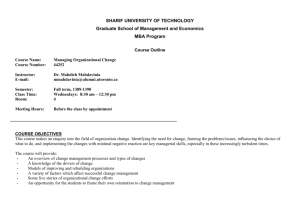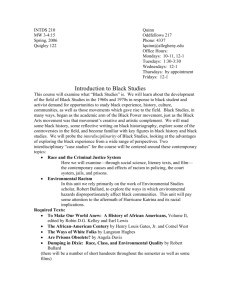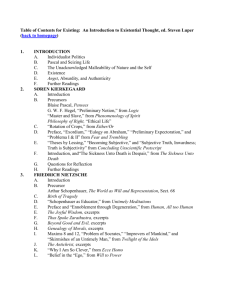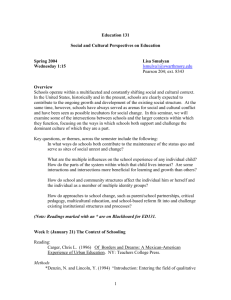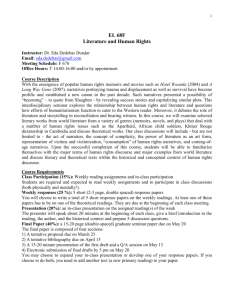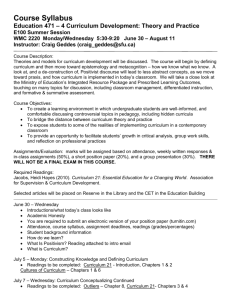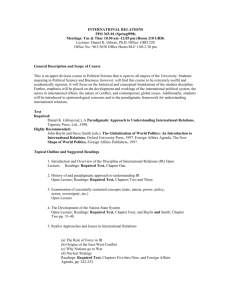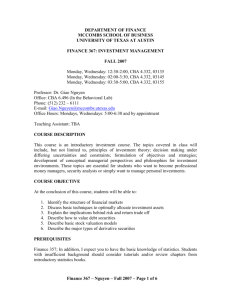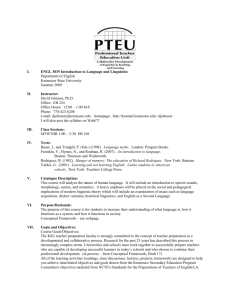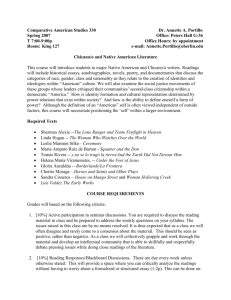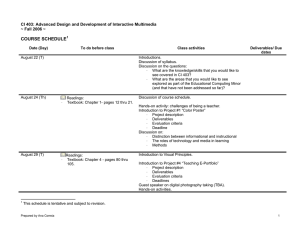The Meaning of Leadership - NYU Wagner
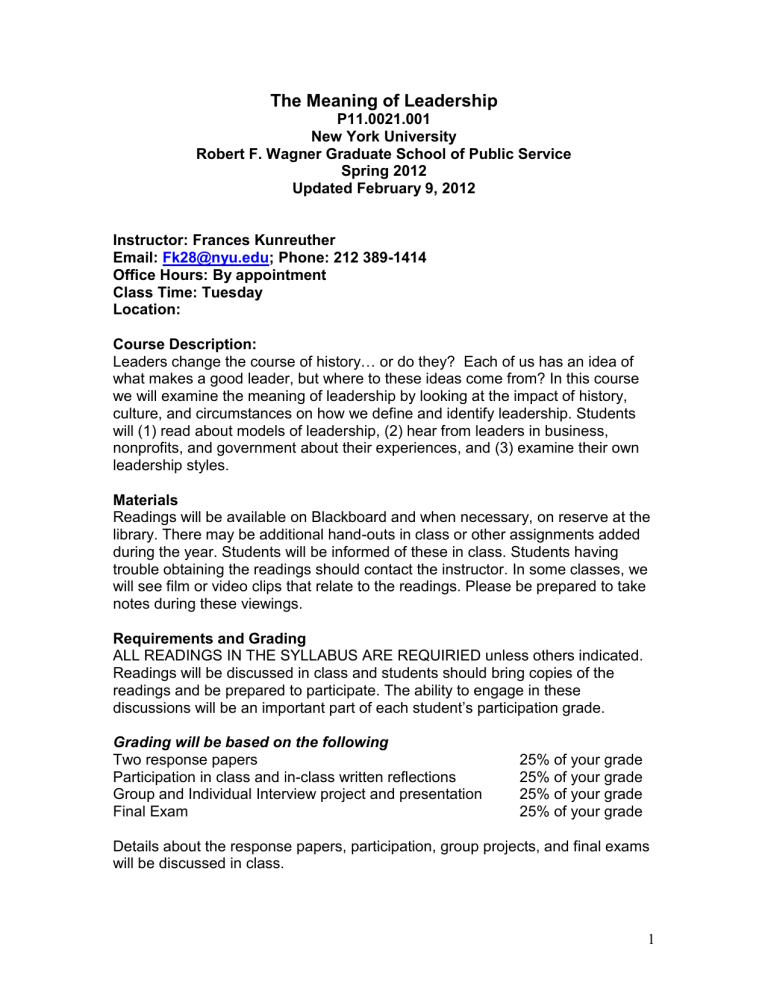
The Meaning of Leadership
P11.0021.001
New York University
Robert F. Wagner Graduate School of Public Service
Spring 2012
Updated February 9, 2012
Instructor: Frances Kunreuther
Email: Fk28@nyu.edu
; Phone: 212 389-1414
Office Hours: By appointment
Class Time: Tuesday
Location:
Course Description:
Leaders change the course of history… or do they? Each of us has an idea of what makes a good leader, but where to these ideas come from? In this course we will examine the meaning of leadership by looking at the impact of history, culture, and circumstances on how we define and identify leadership. Students will (1) read about models of leadership, (2) hear from leaders in business, nonprofits, and government about their experiences, and (3) examine their own leadership styles.
Materials
Readings will be available on Blackboard and when necessary, on reserve at the library. There may be additional hand-outs in class or other assignments added during the year. Students will be informed of these in class. Students having trouble obtaining the readings should contact the instructor. In some classes, we will see film or video clips that relate to the readings. Please be prepared to take notes during these viewings.
Requirements and Grading
ALL READINGS IN THE SYLLABUS ARE REQUIRIED unless others indicated.
Readings will be discussed in class and students should bring copies of the readings and be prepared to participate. The ability to engage in these discussions will be an important part of each student’s participation grade.
Grading will be based on the following
Two response papers
Participation in class and in-class written reflections
Group and Individual Interview project and presentation
Final Exam
25% of your grade
25% of your grade
25% of your grade
25% of your grade
Details about the response papers, participation, group projects, and final exams will be discussed in class.
1
Expectations
Students should come to class prepared and on time. Bring paper, writing implement and reading materials that are assigned for that day unless otherwise indicated.
Attendance is mandatory. In most classes we will have a short-break. You must return from the break on-time to get credit for attending the class.
Please remember that all phones and other electronic devices should be turned completely off during class. If you are using a laptop to take notes, do not use it for other purposes unless asked by the instructor.
From time to time there will be changes in the syllabus, guest speakers or other changes/additions. These will be announced in class. It is the responsibility of the student to keep abreast of all in-class announcements.
Introduction:
Week 1: January 24 – Introduction
What is Leadership
Themes for the Meaning of Leadership Course
Overview of Syllabus
Readings, Requirements, Expectations
Section 1: Leadership: Human Nature, A Set of Skills, Raw
Ambition?
Week 2: January 31
– Where do Leaders Come From?
Some historical views on leadership
How do they differ, how are they the same, what do the say about where leadership comes from
Reading:
Sun Tzu, The Art of War, (500 BCE) Chapters I, II, III, V, VIII
http://www.artofwarsuntzu.com/Art%20of%20War%20PDF.pdf
Confucius Kongfuzi (c. 500 CE): Excerpts from The Analects http://acc6.its.brooklyn.cuny.edu/~phalsall/texts/analects.html
Niccolo Machiavelli (1513 -16): The Prince (excerpts) http://www.the-prince-by-machiavelli.com/the-prince/title.html
(Chapters VIII, XV, XVII, XVIII, XXV )
Jean Jaques Rousseau (1762): The Social Contract (excerpts) http://www.fordham.edu/halsall/mod/rousseau-contract2.html
Week 3: February 7
– Ethical Dilemmas: Making Choices
What are the ethical issues facing leaders?
Film clips: Paths of Glory; Glory
2
Reading:
Interview project discussed; groups assigned
Assign Response Paper #1
Joanne Cui lla (2004) “Ethics and Leadership Effectiveness” in
Antonakis, J., Cianciolo, A, and Sternberg, R. (eds) The Nature of
Leadership , Thousand Oaks, Sage Publications (pp. 302-327) http://www.sagepub.com/booksProdSampleMaterials.nav?prodId=B ook225601 (Chapter 13)
Week 4: February 14 – Make up for FK absence
Cuilla
Guest Speaker at end David Schachter: Understanding Meyers Briggs
Response Paper Assignment
Reading:
Handout on the Meyers Briggs test
Week 5: February 21 Leadership: Heroic or Relational
Small Groups Assignments; choosing Interviewees/developing questions
Joyce Fletcher (2003) The Paradox of Post Heroic Leadership:
Gender Matters . Center for Gender in Organizations, Working
Paper, No. 17.
Daniel Goleman, Richard Boyatzis, Annie McKee (2004): Primal
Leadership, Harvard Business School Press (Chapters 1 & 2, pp. 3-
31)
Developing Interview Questions
Section II: Leadership or Supporting the System: Do Leaders
Make/Change Systems or do Systems Make/Change Leaders
Week 6: February 28 – Leadership: What is Seen and Unseen
Response Paper #1 due
Small Groups: Interview questions and interviewees due (Draft 1)
Identifying Leaders
Reading:
Martin Luther King (1963) Letter from a Birmingham Jail http://www.africa.upenn.edu/Articles_Gen/Letter_Birmingham.htm
Charles Payne (1995) I’ve Got the Light of Freedom University of
California Press (Introduction, Chapter 5: pp. 1-6; 133-179)
Week 7: March 6
– Leading Inside or Outside of the System
Final Interview Questions and List Due
What is the difference between systems leaders and system changers: who is who
Clips from Eyes on the Prize; Malcolm X,
3
Reading:
Jack Welsh (2005) Winning. HarperBusiness (Chapters 2, 3,5 pp.
25-51; 61
–80)
Malcolm X with Alex Haley (1964) Autobiography of Malcolm X excepts in (1995) The Hartwick Humanities in Management
Institute.
Warren Bennis (2003) On Becoming a Leader. Perseuis
(Introduction to revise edition ix – xxiv: Chapter 5, pp. 93-104;
Chapter 7, pp. 133-144)
Week 8: March 13
Spring Break
Week 9: March 20 – Transformational vs. Transactional Leadership
What type of leader are you
Reading
Heifitz, Ronald and Laurie, Donald (1998) The Work of Leadership
Harvard Business Review
MacGregor Burns, James (19 Transforming Leadership / Excepts
TBA
Mintzberg, Henry
Section III: Talking to Leaders
Week 10: March 27 – Nonprofit/Civic Leadership – Making Good
Final Interviews and Reflections Due
Guest Speakers: Edward González-Novoa, Executive Director, Public
Allies New York
Reading:
Crutchfield, L.R. and Grant H.L. (2008) Forces for Good . San
Francisco: Jossey-Bass. (pp. 11-25, 153-158)
Schmitz, Paul (2011) Everyone Leads: Building Leadership from the Community Up . Excerpts TBA
Week 11: April 3 – Business Leadership: From Local to Global
Guest Speaker: Jordan Silber, qdrinks.com
Leaders in the Business World
Reading:
Jim Collins (2001) From Good to Great . Harpers Business
(Chapters 1-3, pp. 1-62)
James M. Couzes and Barry Z. Posner (2002). The Leadership
Challenge. (pp. 3-22)
4
Peter Senge (2
001) “Leadership in Living Organizations,” in eds. F.
Hesselbein, M. Goldsmith and I. Somerville, Organizations without
Walls . Jossey-Bass (Chapter 7, pp. 73-90)
Week 12: April 10 – Public Leadership
Assign Response Paper #2
Guest speaker TBA
Discussion of Public leadership and political leadership
Reading:
Larry D. Terry (2003) Leadership of Public Bureaucracies (Second
Edition) M.E. Sharpe, Armonk, NY (Chapter 1, pp. 3-31)
Ellen Schall (1997) “Notes from a Reflective Practitioner of
Innovation” in eds. A.A. Altshuler and R.D. Behn, Innovation in
American Government: Challenges, Opportunities, and Dilemmas ,
Brookings Institution. http://www.govleaders.org/schall.htm
Seton IV: What’s Around the Corner: Leadership for the Future… and Now
Week 12: April 17 – The Challenge of Form: What’s Ahead
Response Paper #2 Due
Will leadership need to change in the future
Different Ways of Leading
Reading:
Grint, K (2005) “Twenty-First-Century Leadership – The God of
Small Things: or Putting the ‘Ship’ back into ‘Leadership’ in ed CL.
Cooper Leadership and Management in the 21 st Century . Oxford
University Press.
O’Toole, J, Galbraith, J. and Lawler, E.E. (2002) “When Two (or
More) Heads is Better than One: The Promise and Pitfalls of
Shared Leadership” Vol 44:4. California Management Review .
Heifetz, R.. Grashow, A. and Linksy, M. (2009) “Leadership in a
(Permanent) Crisis”
Harvard Business Review , July/Aug,
Week 14: April 24 – Leading in the Future
Small group presentations to class
Process report due
Reading:
Shirky, Clay (2008) Here Comes Everyone; The Power of
Organizing without Organizations Excepts TBA
Diani, M. (2003). ‘Leaders’ or Brokers? Positions and Influence in
Social Movement Networks in Diani, M. and D. McAdam (Eds.).
Social Movements and Networks: Relational Approaches to
Collective Action . Oxford: Oxford University Press.
5
Kunreuther, F., Kim, H, and Rodriguez, R. (2009) Working Across
Generations: The Future of Nonprofit Management.
San Francisco:
Jossey-Bass
Leadership of Tea Party and Occupy Wall Street TBA
Week 15: May 1 –
Review
Take Home Exam Handed Out
Small group presentations to class
6
